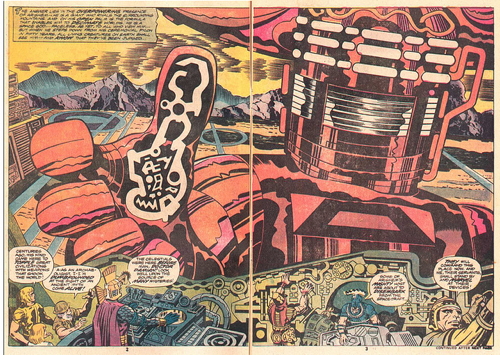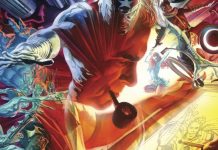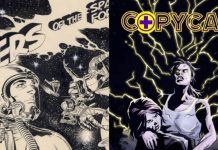I’ve long been awaiting Jeff Trexler’s analysis of the Marvel/Kirby Settlement, and he starts a two-part piece with Should the Kirby Family Have Settled? In case it hasn’t been explicitly stated enough, it was Trexler’s exploration of the potentially ground breaking work for hire aspects of the case that Kirby family attorney Marc Toberoff seems to have used to get the Supreme Court to even look at the case. To allow it to go to decision would have established an important precedent—but it was extremely risky for the Kirby heirs:
That’s not an unreasonable point of view, but it’s also not entirely fair. To see why, it can help to compare the Kirbys’ situation with that of the Siegel heirs in their own pursuit of a historic precedent. As we saw with the Siegels, the calculus in the Siegel case involved more than a decision between a win and a loss. The Siegels filed their lawsuit after agreeing to a set of terms that their previous attorney had informed them was legally binding; the likely and ultimately realized worst-case scenario was that the Siegels would quote-unquote lose with an eight-figure payout. The Kirbys, on the other hand, were in Schroedinger’s Court – the case for the moment was dead and alive, but once the Court observed it the lawsuit would reduce to just one of these states with no in-between.
Trexler also suggest that the votes on the final case may not have been the ones we were expecting. Justice Ruth Bader Ginsburg—who actually requested Marvel answer the petition—may not have been all pro-freelancer:
Nonetheless, while Ginsburg’s dissents in such infamous cases as Citizens United (opposing corporate personhood) and Hobby Lobby (opposing the corporate religious exception for birth control coverage in Obamacare) have made her an anti-corporate hero, her approach to copyright cases is far more tempered. Exhibit #1: Justice Ginsburg wrote the majority opinion in the equally notorious case of Eldred v. Ashcroft upholding the constitutionality of the Sonny Bono Act, the law that extended the term of copyright and kept Mickey Mouse out of the public domain.
Ginsburg also concurred in the Grokster case, an unpopular decision (in free-culture circles, at least) that sided with the music companies against those who believed that online file sharing should be left alone. Moreover, Ginsburg sided with the majority in the recent Aereo case, which helped the big TV networks to keep an Internet start-up from rebroadcasting freely available TV signals. Opposing Ginsburg & the rest of the majority in defending the rights of the corporate copyright establishment: conservative Justices Scalia, Thomas and Alito.
In a subsequent piece, Trexler will look at what we know of the settlement, which it’s been suggested, included a mid-eight figure monetary sum.
I urge everyone to just go read the whole thing. Given what we know, it’s quite possible that we have Trexler himself to thank for the circumstances that allowed the Kirby heirs and Marvel to come to an agreement which allows Jack to finally get his due in the modern Marvel Universe. And for that, we all owe him a huge thank you.









Fantastic work. I have read Heidi’s last paragraph 3 times in a row and it makes me smile from ear-to-ear.
There needs to be a way for parties to a case to agree to a settlement that will remain binding while allowing the case to proceed, to settle points of law that are, at a bare minimum, very likely to recur.
The comment on the TCJ article where R. Maheras once again proves that he can’t read and questions whether Trexler got a “$50 Chili’s gift card” is quite amazing.
Comments are closed.